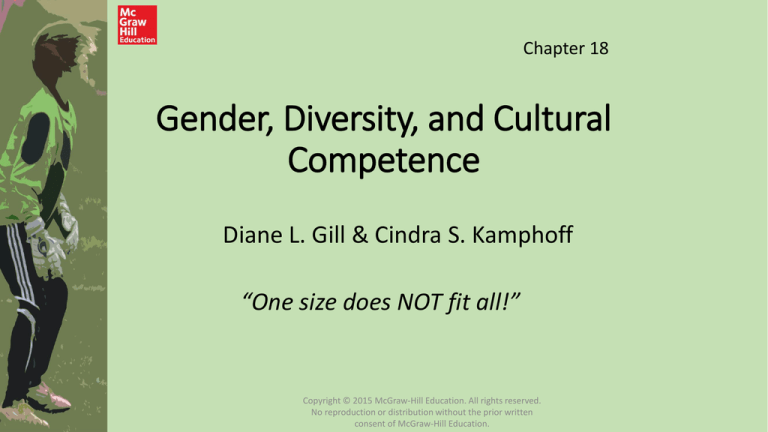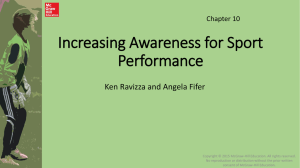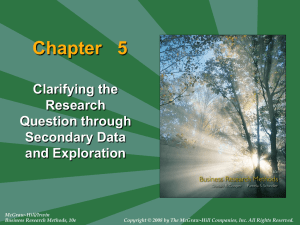
Chapter 18
Gender, Diversity, and Cultural
Competence
Diane L. Gill & Cindra S. Kamphoff
“One size does NOT fit all!”
Copyright © 2015 McGraw-Hill Education. All rights reserved.
No reproduction or distribution without the prior written
consent of McGraw-Hill Education.
Importance
• Gender and cultural diversity issues are
real and powerful
• Cultural diversity has possibilities and
constraints
• Applied sport psychology can best address
gender and cultural diversity by promoting
safe, inclusive physical activity and by
highlighting cultural competence in
professional practice
Copyright © 2015 McGraw-Hill Education. All rights reserved. No
reproduction or distribution without the prior written consent of
McGraw-Hill Education.
Framework
• Multicultural Psychology
• Systematic study of behavior, cognition and affect
in many cultures
• Culture
• Shared values, beliefs and practices of an
identifiable group of people
• Includes gender, race/ethnicity, spirituality,
sexuality, ability)
Copyright © 2015 McGraw-Hill Education. All rights reserved. No
reproduction or distribution without the prior written consent of
Framework (cont.)
• Multiple, intersecting cultural identities: EVERYONE has
gender, race/ethnicity, and multiple cultural identities with
the mix varying across individuals, time and contexts
• Power relations: Culture relations involve privilege
• Who makes the rules? Who is left out?
• Action and advocacy: Multicultural perspectives demand
action for social justice
• Culturally competent applied sport psych professionals
advocate sport for all.
Copyright © 2015 McGraw-Hill Education. All rights reserved. No
reproduction or distribution without the prior written consent of
McGraw-Hill Education.
Gender and Multiple Identities
• Goals:
• Recognize diversity
• Note that disparities still persist despite tremendous gains
for women
• APA’s 2007 Guidelines for Psychological Practice with Girls and
Women
• A multicultural perspective
• Enhances “gender- and culture-sensitive psychological
practice with women and girls from all social classes, ethnic
and racial groups, sexual orientations, and ability/disability
statuses in the United States”
Copyright © 2015 McGraw-Hill Education. All rights reserved. No
reproduction or distribution without the prior written consent of
McGraw-Hill Education.
Sex VS. Gender
• APA’s Guidelines make sex and gender distinct
• Sex = biological aspects of being male or
female
• Gender = psychological, social, and cultural
experiences and characteristics associated
with being male or female
• Individuals vary in how they identify with and
express their gender
Copyright © 2015 McGraw-Hill Education. All rights reserved. No
reproduction or distribution without the prior written consent of
McGraw-Hill Education.
Social Identities
APA’s Guidelines define social identities as personal
and group definitions embedded in social groups and
statuses including:
Gender/Gender identity
Race
Ability level
Culture
Ethnicity
Geographic location
Intellectual ability
Sexual orientation
Class/Socioeconomic status
Age
Body size
Religious affiliation
Acculturation status
Other sociodemographic
variables
Copyright © 2015 McGraw-Hill Education. All rights reserved.
No reproduction or distribution without the prior written
consent of McGraw-Hill Education.
Intersecting Identities
• Your own multiple, intersecting identities impact
EVERYTHING!
Sex/Gender
Education
Class
Ability
Race/Ethnicity
Sexuality
Nationality
Copyright © 2015 McGraw-Hill Education. All rights reserved. No
reproduction or distribution without the prior written consent of
McGraw-Hill Education.
Understanding Issues Related to Identity
Oppression
Privilege
• Discrimination against
• Social status, power, or
and/or systematic denial
institutionalized
of resources to members
advantage gained by
of groups who are
virtue of valued social
identified as different,
identities
inferior, or less deserving
than others
Most people experience both privilege AND oppression
Many do not recognize their own privilege
Copyright © 2015 McGraw-Hill Education. All rights reserved.
No reproduction or distribution without the prior written
consent of McGraw-Hill Education.
If you have ever been the only
person like you (the only girl on
the team, the only athlete in an
advanced academic class) you
likely recognized the power
relations in the situation.
The APA guidelines clearly recognize connections and
interactions of multiple identities and power relations,
and they emphasize social justice and advocacy
Copyright © 2015 McGraw-Hill Education. All rights reserved.
No reproduction or distribution without the prior written
consent of McGraw-Hill Education.
Putting It Together
• Sport psychology is explicitly context-dependent, and
sport culture is unique in many ways
• Must pay attention to:
• Power relations (e.g., how relationships with
those in power such as coaches, athletic directors
and owners impact the athlete)
• Social context in sport (e.g., the environment)
• PLUS retain concern for the individual
Copyright © 2015 McGraw-Hill Education. All rights reserved. No
reproduction or distribution without the prior written consent of
McGraw-Hill Education.
Complications
• Gender and culture are embedded in sport
• It is not enough to try to be nonsexist or nonracist and
treat everyone the same
• Everyone is not the same – cultural identities are
relevant – power and privilege involved
• Identical treatment means treating everyone as if they
were part of the dominant (privileged) group without
considering cultural and individual differences
Copyright © 2015 McGraw-Hill Education. All rights reserved. No
reproduction or distribution without the prior written consent of
McGraw-Hill Education.
Gender and Sport
• The 1972 passage of Title IX of the
Educational Amendments Act, which is the
U.S. federal law that prohibited sex
discrimination in federal funded educational
programs or activities
• Dramatically affected the world of sport
• Female and male participants in sport are
still not equal
• Hardly any female athletic directors, head
athletic trainers, and sports information
directors
Copyright © 2015 McGraw-Hill Education. All rights reserved. No
reproduction or distribution without the prior written consent of
McGraw-Hill Education.
Cultural Diversity in Sport
• Gender bias and white male privilege
• Must think “who makes the rules”
• White males make up just 33% of the U.S. population, YET
• They hold 80% of tenured faculty positions
• 92% of Forbes 400 CEO-level positions
• 80% of the House of Representatives
• 84% of the U.S. Senate
• 99% of the athletic team owners
Copyright © 2015 McGraw-Hill Education. All rights reserved. No
reproduction or distribution without the prior written consent of
McGraw-Hill Education.
Cultural Diversity in Sport (cont.)
• Privileged people often are unaware of power relations
• “Color blindness” often denies opportunity to others
Copyright © 2015 McGraw-Hill Education. All rights reserved. No
reproduction or distribution without the prior written consent of
McGraw-Hill Education.
Gender Scholarship
• Focuses on gender roles and personality
• Emphasis on social context and processes
• Offers a multicultural perspective
• NOT about sex differences
Copyright © 2015 McGraw-Hill Education. All rights reserved.
No reproduction or distribution without the prior written
consent of McGraw-Hill Education.
Gender Stereotypes
• Female athletes receive much less coverage
than males
• The focus is on their femininity and physical
attractiveness
• Stereotypes matter!!!
• Exaggerate minimal gender differences and
restricting opportunities for everyone
• Psychological research confirms that how people
think males and females differ is more important
than how they actually differ
Copyright © 2015 McGraw-Hill Education. All rights reserved.
No reproduction or distribution without the prior written
consent of McGraw-Hill Education.
Sexuality and Sexual Orientation
• Sexuality is linked with gender, especially in sport contexts
• Male-female biological sex, masculine-feminine personality, and
homosexual-heterosexual categories are not clear binaries
• Individuals’ gender identities, gender expressions, and sexual
orientations are even more varied, and not necessarily linked
Copyright © 2015 McGraw-Hill Education. All rights reserved. No
reproduction or distribution without the prior written consent of
McGraw-Hill Education.
Sexuality and Sexual Orientation (cont.)
• Homophobia
• Discrimination and prejudice on the basis of sexual
orientation, irrational fear
• Sexual Prejudice
• Attitude directed at a social group, involving hostility or
dislike (Herek, 2000)
• Heterosexism
• Institutionalized oppression of non-heterosexual people
Copyright © 2015 McGraw-Hill Education. All rights reserved. No
reproduction or distribution without the prior written consent of
McGraw-Hill Education.
Sexuality and Sexual Orientation
(cont.)
• Homophobia in sport is typically discussed in relation to
women’s athletics
• Stereotype = sport attracts lesbians (not gay men)
• NO research or logic supports any relationship between
sexual orientation and sport
• Sport is a particularly hostile environment for LGBT youth
• Face discrimination
• Bullying
• Do not feel supported by school officials
Copyright © 2015 McGraw-Hill Education. All rights reserved. No
reproduction or distribution without the prior written consent of
McGraw-Hill Education.
Sexual Harassment
• Behavior towards an individual or group that involves sexualized
verbal, non-verbal or physical behavior, whether intended or
unintended, legal or illegal, that is based on an abuse of power
and trust and that is considered by the victim or a bystander to
be unwanted or coerced
• Sport climate fosters sexual harassment and abuse
• Young, elite female athletes are particularly vulnerable
• Neither athletes nor coaches have education or training
about the issues
• Research and professional development are needed to
address the issues
Copyright © 2015 McGraw-Hill Education. All rights reserved. No
reproduction or distribution without the prior written consent of
McGraw-Hill Education.
Race and Ethnicity
• Stereotypes and stereotype threat
• The fear of confirming negative stereotypes
• Negative stereotypes are common in sport and
lead to performance decrements
• White men can’t jump
• Girls can’t throw
FALSE
• Black athletes have natural talent
• White athletes are smarter
• People are members of multiple groups, and how
they think about their group membership is critical
Copyright © 2015 McGraw-Hill Education. All rights reserved. No
reproduction or distribution without the prior written consent of
McGraw-Hill Education.
Physicality and Cultural Diversity
• Opportunity is limited by physicality:
• Physical abilities
• Physical skills
• Physical size
• Physical fitness
• Physical appearance
• Exclusion on the basis of physicality is
nearly universal in sport and exercise
Copyright © 2015 McGraw-Hill Education. All rights reserved. No
reproduction or distribution without the prior written consent of
McGraw-Hill Education.
Cultural Sport Psychology
1. Awareness of one’s own cultural values and biases
2. Understanding of other worldviews
3. Development of culturally appropriate skills
Culturally competent professionals act to empower participants,
challenge restrictions, and advocate for social justice
Copyright © 2015 McGraw-Hill Education. All rights reserved. No
reproduction or distribution without the prior written consent of
McGraw-Hill Education.
Cultural Sport Psychology (cont.)
• Cultural Competence tips for professionals:
• Context is everything
• Culture, race, and ethnicity as separate
indexes do little to inform us
• Using paradigms reflecting differing
worldviews
• Listen as much as (or more than) you talk
while engaging in culturally-informed
interactions
Copyright © 2015 McGraw-Hill Education. All rights reserved. No
reproduction or distribution without the prior written consent of
McGraw-Hill Education.
Cultural Sport Psychology (cont.)
• Continuum of Cultural Competence
• Cultural Destructiveness: Policies, actions, and beliefs that are damaging
to cultures
• Cultural Incapacity: Not intending to be culturally destructive, but lack
ability to respond effectively to diverse people
• Cultural Blindness: Philosophy of being unbiased and that all people are the
same
• Cultural Pre-competence: Desire but no clear plan to achieve cultural
competence
• Cultural Competence: Respect and recognition for diversity, genuine
understanding of cultural differences
• Cultural Proficiency: Culture held in high esteem and it is understood to be
an integral part of who we are
Copyright © 2015 McGraw-Hill Education. All rights reserved. No
reproduction or distribution without the prior written consent of
McGraw-Hill Education.








